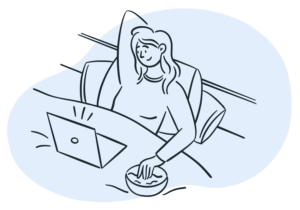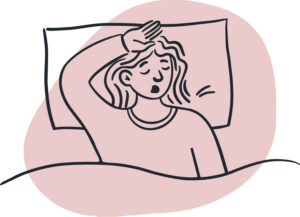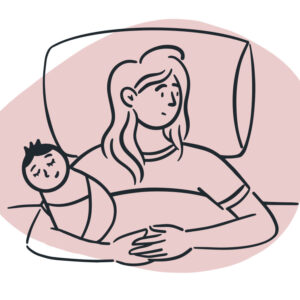How to Sleep with a Migraine
Disclosure: By clicking on the product links in this article, Mattress Nerd may receive a commission fee at no cost to you, the reader. Read full disclosure statement.
Mattress Nerd consulted Dr. Heidi Moawad to ensure that this article met our editorial standards.
If you’re a poor, unfortunate soul like me, you’ve probably had one of those days with a migraine that just won’t go away. It hurts to read, look at a screen, and sometimes even just plain think. So, you probably turn to the one thing requiring the least brainpower to provide respite: sleep.
But even just lying still on the bed with your eyes squeezed shut can become an impossible task with a troublesome migraine. Fortunately, we’re here to help. Read on to learn more about the link between sleep and migraines, and some tips with how to effectively sleep while your head is pounding.
What Are Migraines?
Simply put, a migraine is a headache but worse. More specifically, it’s a pounding headache that usually affects one side of the head, with a series of intense symptoms that distinguish it from your good old-fashioned headache. They can last anywhere from a few hours to days, coming and going as they so please.
Symptoms
Common migraine symptoms that differentiate them from “normal” headaches include:
- Pain that radiates from one side of the face
- Sensitivity to light, sound, and smells
- Nausea
- Vomiting
- Fatigue
- Muscle aches
Some people also experience migraine with aura, which the Mayo Clinic describes as a possible “warning sign” for migraines. The nervous system sends mixed signals as part of the oncoming migraine attack. Usually, you’ll have visual disturbances, such as flashing, sparks, or even temporary vision loss. Some people may even experience physical phenomena like tingling or weakness in their limbs.
And, of course, since none of these symptoms are fun to deal with, migraines often make a person cranky, irritable, anxious, or depressed.
Overall, none of these are easy things to try and sleep through.
Of course, don’t use this list to diagnose yourself. If you’re struggling with similar symptoms and think you may be suffering from migraines, we recommend consulting a medical professional.
Migraines and Sleep
Migraines and sleep are more connected than some might think. A study conducted in 2016 found that those with poor sleep quality also suffered from more migraine attacks. This was also true for those who sleep too little or too much. As for the proverbial chicken-versus-egg debate, it seems that either can cause or perpetuate the other.
So, it’s a cycle—you can’t sleep because you have a migraine, you get migraines because you can’t sleep. How do we break it?
Tips for Sleeping with a Migraine
Everyone’s different, but I’ve compiled a list of helpful advice from professionals, as well as some of my own input from personal experience.
Getting Ready for Bed
- Set a bedtime and stick to it! Creating a routine ensures you get enough sleep and lets your body know when it’s time to wind down.
- Don’t bring work or stress into bed with you. Try to do something relaxing before bed. Keeping work and relaxing separate helps your body get into the sleep mindset. This goes for during the day too: avoid doing work in bed, as your brain may associate your bed with it rather than sleep.
- No screens at least 30 minutes before bed. You’ve probably heard this one time and time again, but it’s true! Blue light tricks your eyes into thinking it’s still daytime, throwing off your circadian rhythm. For migraines especially, straining to look at your phone or TV can make the pain even worse.
Sleeping Position
Experts say the best position to sleep is on your back, since your spine and neck will be in the proper alignment. This follows for migraines, since pain is radiating from the head. Staying in one position is the best, as even the smallest jostle can aggravate your head pain. Combination sleepers who switch between positions may find it difficult to sleep with a migraine because of their tossing and turning.
I’ve personally found it difficult to lay on my back with a migraine. I often need pressure on the side of my head that’s throbbing so I don’t focus on it, thus I tend to sleep on my side, or even my stomach with my head on my forearms. If you sleep on your back, you may have to lay your arm over your eyes, which can be an awkward position to sleep in.
I’ve found relief by using a warm or cold compress, which allows me to sleep however I want while keeping pressure on my eyes.
Outside of Bed
Of course, there are things you can do before bed to ensure that you get a good night’s sleep. Even if you don’t have migraines, some of these protocols may be good to follow!
- Exercise–Keeping healthy like maintaining daily exercise and staying active is beneficial for migraines and your body overall.
- Food and drink–Certain foods and drinks can affect how often or how severe your migraines are. Consider adapting a migraine-friendly diet.
- Migraine-triggering foods–These are more common than you might think, ranging from MSG and artificial sweeteners to deli meats and dairy. Check out this in-depth list from the American Migraine Foundation. Not everyone with migraines is sensitive to all potential migraine-inducing foods, but it’s worth figuring out if certain foods will trigger your migraines.
- Alcohol and caffeine–When it comes to drinks, alcohol, specifically red wine, is a big trigger for migraines. Caffeine is a tricky one; some migraine medications have caffeine to relieve symptoms, but too much can also make them worse.
- Manage stress–As stress is another possible migraine trigger, it’s important to make sure you don’t get overwhelmed. I know I’ve had plenty of “tension” headaches that morph into full-blown migraines. If you’re suffering from severe stress that impacts your life and sleep, reach out for help from a mental health professional.
- Check your medication–Many prescription medications have migraine attacks as a side effect. If your headaches become debilitating, it might be time to talk with your doctor or healthcare provider to see if there are other options.
Conclusion
A pesky migraine can ruin not just your day, but also your good night’s sleep. Once the over-the-counter painkillers and cold compresses stop cutting it, it may be time to talk to your doctor. But until then, feel free to follow our advice for some short-term relief. After all, sleep is important and integral to your health, especially when you’re not at your best!
Sources
Lin, Y. K., Lin, G. Y., Lee, J. T., Lee, M. S., Tsai, C. K., Hsu, Y. W., Lin, Y. Z., Tsai, Y. C., & Yang, F. C. (2016). Associations Between Sleep Quality and Migraine Frequency: A Cross-Sectional Case-Control Study. Medicine, 95(17), e3554. https://doi.org/10.1097/MD.0000000000003554
Mayo Clinic Staff. (2022, October 4). Migraines: Steps to Head off the Pain. Mayo Clinic. www.mayoclinic.org/diseases-conditions/migraine-headache/in-depth/migraines/art-20047242
Mayo Clinic Staff. (2023, July 7). Migraine. Mayo Clinic. www.mayoclinic.org/diseases-conditions/migraine-headache/symptoms-causes/syc-20360201
Diamond, M. L., & Marcus, D. A. (2022, December 13). Diet and Headache Control. American Migraine Foundation. https://americanmigrainefoundation.org/resource-library/diet/


